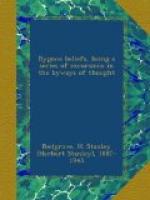[2] For instance, the well-known physicist, Sir W. F. BARRETT, F.R.S. (late Professor of Experimental Physics in The Royal College of Science for Ireland). See his On the Threshold of a New World of Thought (1908), SE 10.
In illustration of the real power of the imagination, I may instance the Maori superstition of the Taboo. According to the Maories, anyone who touches a tabooed object will assuredly die, the tabooed object being a sort of “anti-talisman”. Professor FRAZER[1] says: “Cases have been known of Maories dying of sheer fright on learning that they had unwittingly eaten the remains of a chief’s dinner or handled something that belonged to him,” since such objects were, ipso facto, tabooed. He gives the following case on good authority: “A woman, having partaken of some fine peaches from a basket, was told that they had come from a tabooed place. Immediately the basket dropped from her hands and she cried out in agony that the atua or godhead of the chief, whose divinity had been thus profaned, would kill her. That happened in the afternoon, and next day by twelve o’clock she was dead.” For us the power of the taboo does not exist; for the Maori, who implicitly believes in it, it is a very potent reality, but this power of the taboo resides not in external objects but in his own mind.
[1] Professor J. G. FRAZER, D.C.L.: Psyche’s Task (1909), p. 7.
Dr HADDON[2] quotes a similar but still more remarkable story of a young Congo negro which very strikingly shows the power of the imagination. The young negro, “being on a journey, lodged at a friend’s house; the latter got a wild hen for his breakfast, and the young man asked if it were a wild hen. His host answered `No.’ Then he fell on heartily, and afterwards proceeded on his journey. After four years these two met together again, and his old friend asked him `if he would eat a wild hen,’ to which he answered that it was tabooed to him. Hereat the host began immediately to laugh, inquiring of him, `What made him refuse it now, when he had eaten one at his table about four years ago?’ At the hearing of this the negro immediately fell a-trembling, and suffered himself to be so far possessed with the effects of imagination that he died in less than twenty-four hours after.”
[2] ALFRED C. HADDON, SC.D., F.R.S.: Magic and Fetishism (1906), p. 56.
There are, of course, many stories about amulets, etc., which cannot be thus explained. For example, ELIHU RICH gives the following:—
“In 1568, we are told (Transl. of Salverte, p. 196) that the Prince of Orange condemned a Spanish prisoner to be shot at Juliers. The soldiers tied him to a tree and fired, but he was invulnerable. They then stripped him to see what armour he wore, but they found only an amulet bearing the figure of a lamb (the Agnus Dei, we presume). This was taken from him, and he was then killed by the first




